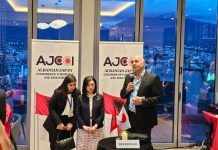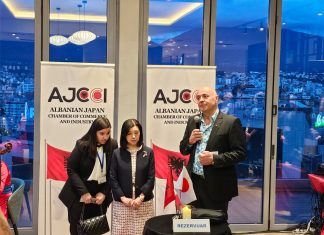This year we celebrated the 20th anniversary of the liberation of Kosova.
I remember very well, when in September 1999, with Congressman Engel, my friends of NAAC, and others, crossed the border and for the first time ever we didn’t have to deal with Serbian soldiers.
We entered from Macedonia. A year before, congressman Engel had tried to enter from there and the Serbian soldiers didn’t allow him. He said to the international press accompanying him: “today, Milosevic is preventing us from entering Kosova. The day will come when Kosova will be free and we will then stop Milosevic from entering Kosova.”
His words were prophetic. That September 1999, we knew Milosevic could not enter Kosova anymore. Meanwhile, we were there, and everyone was crying from joy. Including, 90-year old Anthony Athanas, who came with us from Boston. As soon as we crossed the border, we stopped the bus and got out to kiss the free land of Kosova. We hugged each other.
During that trip, we saw a devastated country. Serbs had destroyed entire towns and villages. Later mass graves would be found. Thousands of dead bodies had been taken to Serbia and thrown in mass graves, many still to be found to this day.
More than 20,000 women were raped; and the survivors are finally finding their voice now. They deserve our support.
These statistics don’t include hundreds of thousands of people left crippled or with wounds and lifelong traumas. Many lost their best years for professional development, education, etc.
This year we remembered also the 20th anniversaries of many massacres that took place in Kosova in 1999. Serbia tried to expel at least half of the population in a clear attempt at ethnic cleansing. More than a million of people were deported forcibly to the neighboring countries, mostly in Albania and Macedonia.
The war crimes of 1999 were nothing new. It was the fourth war of the Milosevic regime in the 1990s. The greatest massacre had taken place in Srebrenica in 1995, where 8,000 Bosniaks, men and boys had been slaughtered without mercy.
We consider all these events to be an important part of the history of Europe and the world.
The bitter truth however is that our history is under attack. Our memories are being insulted and ridiculed.
Yesterday, in Stockholm, Peter Handke, an Austrian writer, who acted as a propaganda tool for the Milosevic regime, was awarded the Nobel Prize on Literature 2019. Handke has glorified Serbian war criminals. He supported their wars and mocked their victims. He has said that Muslims in Bosnia faked their tragic events.
He visited Kosova when the country was under martial law and decided to become a Yugoslavian citizen, in 1999, when Kosova was liberated by NATO, to show his solidarity to the Milosevic regime.
Even after the Serbs themselves overthrew Milosevic, he didn’t give up on his favorite war criminal. In 2006, when Milosevic died, Handke delivered a speech in his funeral.
The Swedish Academy and the King of Sweden should be ashamed for ignoring the protests from the families of the victims. On the other hand, the voices of protest from the rest of Europe were not strong enough. A genocide denier now has been given the highest award in literature. It will give power his shameless, false testimony to future generations.
This is serious. Only a few days ago, the President of Serbia, Alexander Vucic said the Reçak Massacre was faked and insulted Ambassador William Walker for his historic testimony. The massacre that prompted the West to finally act against Milosevic has been investigated and verified by many independent sources and remains an historic fact. It was only one of many similar massacres that have happened in Kosova, Bosnia and elsewhere, from the security and paramilitary forces of Serbia and Yugoslavia in the 1990s.
The irresponsible statement by the President of Serbia is only one illustration of how our history is coming under attack. The war ended only 20 years ago, and the survivors are still alive to tell their stories. We should speak up! We should write! We should film! We should not let others manipulate the truth and rewrite history when the people who lived through it are still alive. If we don’t tell our stories others will them for us.
The delay or the lack of condemnations of Vucic’s declaration from our Western partners and allies (only a couple of embassies issued statements of condemn). The silence about Handke’s coronation in Stockholm. The one-sided Special Chamber in The Hague. All these and more show that we cannot expect from others to defend our history and our truths, if we don’t do it ourselves.
We should not allow Vucic and his ilk to kill our heroes for a second time. We should not accept that our people relive their moments of terror. Our people don’t just know the truth, they have lived through it. This is not some Serbian myth from 1389 about things that didn’t happen. This is about what we lived through in our lifetime. They will not be able to bury the truth. But we should stand up for our history and our memory. We shall never forget.
Harry Bajraktari is founder and publisher of Illyria newspaper (1991-1998), an Albanian-American community leader, philanthropist and recipient of many awards, including the Honor of the Nation Order by the President of Albania, Kosova’s Presidential Medal for Merits & the White House Presidential Call to Service Award.



















